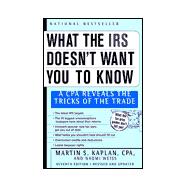
Note: Supplemental materials are not guaranteed with Rental or Used book purchases.
Purchase Benefits
What is included with this book?
| Acknowledgments | |
| Why Every Taxpayer Must Read This Book | |
| CPAs Grade Clients | |
| The IRS Personality: Playing It to Your Advantage | |
| Events That Shaped the IRS Personality | |
| Never Forget!Acknowledging Dedicated IRS Personnel | |
| Who Runs the Show: What You're Up Against | |
| The Image | |
| What It Looks Like from the Inside Out | |
| The Organization | |
| What You Need to Know about the Examination Division | |
| What You Need to Know about the Collection Division | |
| What You Need to Know about the Criminal Investigation Division | |
| What You Need to Know about the Taxpayer Services Division | |
| IRS People: Whom You Need to Know | |
| What They're Really Like | |
| How to Work with Them | |
| Standard Operating Procedures | |
| The IRS Chain of Command | |
| Who Runs the Show? | |
| The Examination Division | |
| The Collection Division | |
| The Criminal Investigation Division | |
| The Upper Echelons | |
| Offering a Bribe-What Are the Consequences? | |
| Standard Operating Procedures | |
| Neutralizing the IRS's Power | |
| The IRS Power Base | |
| Power from Information Resources | |
| Power from the IRS's Unique Legal Standing | |
| Power from Its Unique Role as a Law Enforcement Agency | |
| Power from Its Unique Legislation-Creating Authority | |
| Power to Make Mistakes without Consequences | |
| Power from the Freedom to Do What It Wants | |
| Why Does This Continue? | |
| IRS Technology: What Works, What Doesn't Work | |
| The Processing Pipeline | |
| The Nonprocessing Pipeline | |
| The Rest of the Process | |
| Where the IRS Technology Works | |
| Where Mistakes Are Made in the IRS Matching Program | |
| Where the IRS Technology Falls Short on the Income Side | |
| Where the IRS Technology Falls Short-Mortgage Interest and Real Estate Tax | |
| Where the IRS Technology Falls Short-Nonfilers and Underreporters | |
| Where the IRS Technology Falls Short-Lack of Reporting Requirements for Corporations | |
| Where the IRS Technology Falls Short-The Audit Level | |
| Technology Overhaul a Fiasco-Still | |
| IRS Targets and What to Do If You're One of Them | |
| Are You in the Line of Fire? | |
| Target: The Self-Employed | |
| Target: Cash-Intensive Businesses | |
| Target: Industries in the Market Segment Specialization Program | |
| Target: Nonfilers | |
| Target: Tax Cheaters-Omission of Income | |
| Target: Tax Delinquents and Tax Scam Artists | |
| How to Completely Avoid an Audit | |
| Don't Fear Audit Statistics | |
| Audits at an All-Time Low."Live" Audits Are Aimed at Corporations | |
| Audits of Estate and Gift Tax Returns | |
| How to Prevent Audit Problems Before They Occur | |
| How Long Should Taxpayers Keep Records? | |
| How to Completely Avoid an Audit | |
| Small Business Corporations (S Corporations) | |
| Limited Liability Companies and Partnerships | |
| Partnerships | |
| Business Ventures and the Hobby Loss Rule | |
| Businesses That Include Merchandise Inventory | |
| Securing a Tax-Advantaged Life | |
| The Twenty Greatest Taxpayer Misconceptions | |
| How to Hold On to More Money: Overlooked Credits and Deductions | |
| Selling Securities from a Dividend Reinvestment Plan | |
| Identifying Specific Securities That Are Sold | |
| Unamortized Points on a Home Mortgage | |
| Deductible Interest on a Home Equity Loan | |
| Unused Losses, Expenses, and Credits | |
| Self-Employed Deduction for Health Insurance | |
| Charitable Donations-Securities | |
| Charitable Donations-Household Items | |
| Social Security Tax Overpayments | |
| Job-Hunting Expenses | |
| State Income Tax Deductions | |
| Parental or Grandparental Support | |
| Federal Income Tax Withheld on Form 1099 | |
| Classroom Expenses for Teachers | |
| Ten Ground Rules Never to Break to Win with the IRS | |
| Rule | |
| Always Report Income on Your Tax Return That Is Being R | |
| Table of Contents provided by Publisher. All Rights Reserved. |
The New copy of this book will include any supplemental materials advertised. Please check the title of the book to determine if it should include any access cards, study guides, lab manuals, CDs, etc.
The Used, Rental and eBook copies of this book are not guaranteed to include any supplemental materials. Typically, only the book itself is included. This is true even if the title states it includes any access cards, study guides, lab manuals, CDs, etc.
Excerpted from What the IRS Doesn't Want You to Know: A CPA Reveals the Tricks of the Trade by Martin S. Kaplan, Naomi Weiss
All rights reserved by the original copyright owners. Excerpts are provided for display purposes only and may not be reproduced, reprinted or distributed without the written permission of the publisher.